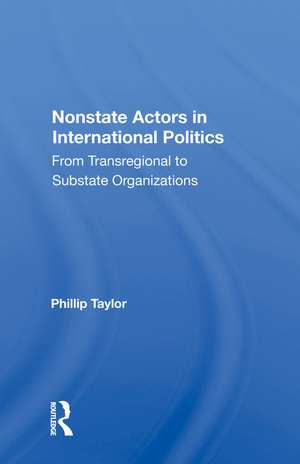Nonstate Actors In International Politics: From Transregional To Substate Organizations
Autor Phillip Tayloren Limba Engleză Hardback – 7 iun 2019
Preț: 767.80 lei
Preț vechi: 1029.53 lei
-25% Nou
Puncte Express: 1152
Preț estimativ în valută:
146.91€ • 154.21$ • 121.94£
146.91€ • 154.21$ • 121.94£
Carte tipărită la comandă
Livrare economică 10-24 aprilie
Preluare comenzi: 021 569.72.76
Specificații
ISBN-13: 9780367019167
ISBN-10: 0367019167
Pagini: 268
Dimensiuni: 149 x 229 mm
Greutate: 0.65 kg
Ediția:1
Editura: Taylor & Francis
Colecția Routledge
Locul publicării:Oxford, United Kingdom
ISBN-10: 0367019167
Pagini: 268
Dimensiuni: 149 x 229 mm
Greutate: 0.65 kg
Ediția:1
Editura: Taylor & Francis
Colecția Routledge
Locul publicării:Oxford, United Kingdom
Cuprins
Preface -- Introduction -- Nonstate Actors and the State-Centric Model -- A Framework for Analysis -- Theories of International Integration -- Economic International Governmental Organizations -- The European Community -- The Andean Group and the Association of South East Asian Nations -- Other Common Markets, Free Trade Associations, and Development Organizations -- OPEC and Other Commodity “Cartels” -- Security Alliances -- The North Atlantic Treaty Organization -- The Warsaw Pact and Other Alliances -- Political International Governmental Organizations -- The Organization of American States -- The Organization of African Unity -- Other Political IGOs -- Cultural/Ideological International Governmental Organizations -- The Arab League -- The Nordic Council and the Islamic Conference -- Integration Among Nongovernmental Actors -- Multinational Corporations and International Labor Unions -- Transnational Ethnic Groups
Descriere
One of the most notable trends in the study of international relations is the resurgence of interest in international organizations, particularly those outside the United Nations. Regional international governmental organizations, multinational corporations, international labor unions, and transnational ethnic groups have become increasingly salient actors in world politics. OPEC, NATO, EEC, and PLO, for example, are all widely understood acronyms, and even a casual review of the crises in Iran and Afghanistan reveals the pervasive involvement of NATO, the European Community, the Islamic Conference, the International Olympic Committee, and more than one hundred other international governmental and nongovernmental organizations. Although international organizations are not likely to replace nation-states as the primary actors in world politics, their growing involvement in global political and economic issues challenges the assumptions of the traditionalists' state-centric model, as well as those whose interests begin and end with the United Nations. This book goes beyond the traditional UN-focused studies of nonstate actors to provide students with a comprehensive analytical survey of the many other organizations that help shape today's events. A common framework is used to examine what each nonstate actor does, how it organizes to achieve its ends, and how it makes multilateral/international decisions. The degree of integration in each nonstate actor is evaluated.
